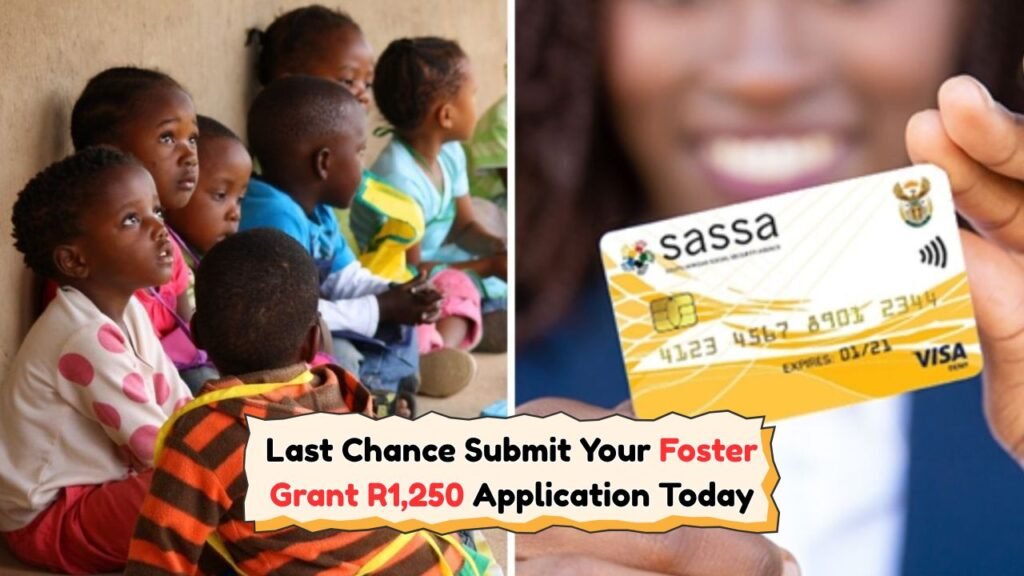Act Fast: R1,250 Foster Child Grant Applications Close This September 2025: South African families and guardians who are primary caregivers for foster children are urged to act swiftly as the deadline approaches for the 2025 Foster Child Grant. This vital support initiative, offering a monthly stipend of R1,250 per child, is designed to alleviate the financial burden on caregivers and provide foster children with better living conditions and opportunities. As the closing date in September 2025 looms closer, it is crucial for eligible applicants to gather necessary documentation and submit their applications promptly. With the South African Social Security Agency (SASSA) managing the application process, families must ensure they meet all prerequisites to secure this essential funding.

Understanding the Importance of the R1,250 Foster Child Grant
The R1,250 Foster Child Grant plays a pivotal role in supporting foster families across South Africa. This grant aims to provide financial assistance to those who have opened their homes to foster children, ensuring that these children can access basic necessities such as food, clothing, and school supplies. By offering this financial aid, the government seeks to support and stabilize the lives of foster children, providing them with a nurturing environment that encourages growth and development. The grant not only eases the financial pressure on caregivers but also helps integrate foster children into a more inclusive and supportive community. As the deadline for applications approaches, understanding the grant’s impact on the children’s quality of life is essential, highlighting the importance of timely applications to ensure no child is left without the support they need.
Eligibility Criteria for the 2025 Foster Child Grant in South Africa
To qualify for the 2025 Foster Child Grant, applicants must meet specific criteria set by SASSA. Firstly, the child must be legally placed in foster care, with a formal court order validating the placement. This ensures that the grant is directed to children who are legally recognized as needing foster care. Additionally, both the caregiver and the child must be residents of South Africa, and the child must be under the age of 18. The application also requires the caregiver to provide pertinent documentation, including identification documents, proof of residence, and the child’s birth certificate. The grant is available regardless of the caregiver’s income, making it accessible to a wide range of families. As the deadline draws near, prospective applicants should ensure they have all necessary documents and understand the eligibility requirements to facilitate a smooth application process.
How to Apply for the Foster Child Grant Before September 2025
Applying for the Foster Child Grant requires careful attention to detail and adherence to the application guidelines set by SASSA. Applicants must complete the official application form, which can be obtained from any SASSA office or downloaded from the agency’s website. Alongside the completed form, applicants must submit the required documents, including the court order of foster care, identification documents for both the child and caregiver, and any additional paperwork specified by SASSA. It is advisable for applicants to submit their applications in person at their nearest SASSA office to ensure all documents are correctly processed and to address any potential queries immediately. As September 2025 approaches, applicants are encouraged to avoid last-minute submissions, allowing adequate time for any unforeseen issues that may arise during the application process.
The Impact of Missing the Foster Child Grant Deadline
Failing to meet the September 2025 deadline for the Foster Child Grant can have significant consequences for foster families across South Africa. Missing the application deadline means that caregivers will not receive the vital financial support needed to adequately provide for foster children. Without this assistance, families may struggle to meet the daily needs of foster children, impacting their quality of life and overall well-being. The absence of financial aid can also hinder the children’s educational opportunities and access to healthcare, affecting their long-term development and integration into society. It is therefore imperative for caregivers to prioritize the grant application process, ensuring all required documentation is prepared and submitted well before the deadline. By doing so, they can secure the necessary funding to support the foster children’s journey towards a brighter future.



